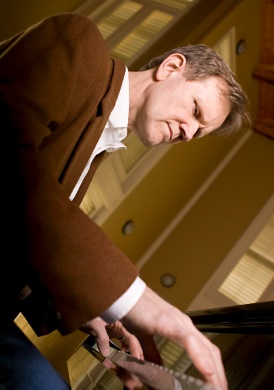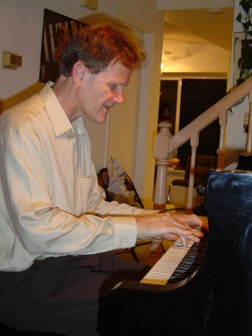Michael Dulin is one of the most versatile musicians I’ve ever encountered. Classically-trained in the “Russian School” of piano technique at Juilliard in New York and Birmingham-Southern College in Alabama, Mike moves easily from one musical style to the next. He composes his own wonderful pieces, plays several times a year with a group of Southern jazz legends, recently toured as the keyboard player for The Temptations Review, filled in for the keyboard player in several musical productions (“Mama Mia” recently), creates advertising music, and on and on. He can very literally do it all and do it well! Over the past year and a half, we’ve become very good friends, although we haven’t yet met. Mike plans to come out for the Whisperings Solo Piano Showcase in July, so we’re almost there. This interview came from a phone conversation in early April 2004, and some preliminary questions by email.
Dan Michael Dulin was born on 9/17/1952 in Birmingham, Alabama, where he still resides. Mike’s dad worked for US Steel, and his mom worked in her father’s furniture store and then in a doctor’s office filing insurance claims. Mike has one sister, Brenda, who is three years older. He and his partner, Dan Whiteside, own the Equity Digital label and PSI Digital in Birmingham, a successful recording studio which produces commercial music and voice-overs, other artists’ recordings, and Mike’s CDs. To date, Michael Dulin has released three albums (“The One I Waited For,” “Atmospheres,” and “Balance of Nature” with flutist Chuck Offutt), with several more in the works.
KP: How old were you when you started taking piano lessons? How long did you take formal lessons?
MD: I BEGGED to take piano lessons after my sister started. I would watch her, and play what she was learning. She didn’t like the piano, so I took over as the student when I was about six. My first teacher made the mistake of playing the pieces that she assigned me. I just listened and could play them instantly. She thought I was reading, but I was playing by ear. A year later, when she moved to Texas, she arranged for me to take lessons with a teacher in the pre-college program at Birmingham-Southern College (a great music school!). She told the teacher that I was a genius. Of course, at the first lesson, the teacher discovered that I could not read a note! So much for the genius... She quickly figured out what had happened, and that was the end of my teacher playing the music for me. I had to learn how to read, and I’m still a really good sight reader. I continued to study music throughout college, and have a Masters Degree in piano performance.
KP: How old were you when you started improvising?
MD: Probably 8-9 years old. I started by doing variations on pieces that I was learning in lessons. When I was a little older I would challenge myself to improvise for 10-15 minutes at a time in the style of Scriabin one day, Chopin the next, etc.
KP: When did you know that you wanted to be a professional musician? Did your parents resist or object?
MD: I always wanted to be a professional musician. Not for a moment did I consider anything else. My parents were wonderful. Having a son as a musician probably wouldn’t have been their first choice, but they never made me feel this. Both my mother and father made sure that I had everything I needed to succeed, making sacrifices so I could study and grow as a musician. My mother spent thousands of hours driving me to lessons and performances, and she and my dad sacrificed so I could have a Steinway grand on my 15th birthday. When I think of all the things they did for me, I realize that I can never begin to repay them.
KP: I’ve read that you were inspired to start writing your own full-length pieces during a backpacking trip.
MD: I went up to the Linville Gorge in North Carolina because I’d been so busy here. I’d been there once years ago, and it was so beautiful. On the first trip, I was in a bear sanctuary, so it was kind of spooky! During the years between the trips, my life had gotten so much more complicated. I was hearing music in my head all the time, but it was advertising music or classical music that I was practicing or music that I was producing or session work that I was doing, so the quiet of the forest was absolutely a cleansing experience. After a few days in the woods, in the quiet, it was as if suddenly I could hear music that was authentically me. It had been crowded out by all this other music that I was doing. After hearing this new and original music in me, I still didn’t have any thought of recording it, but one day I went to downtown Highlands, NC, which is also a very quiet place. It’s an amazing town because you can go anywhere, and all of the people are quiet. Just about every shop that I went into was playing very quiet piano music, and it was pleasant. I started looking around at some of the people who were writing that and thought, “This is something I can do. It would be healing for me, because it will give me the same experience here at home that I had when I was in the woods. At the same time, it might give a healing experience to other people. They might hear that same kind of directness and release that I experienced if I can just make this music happen.” So that was my purpose.
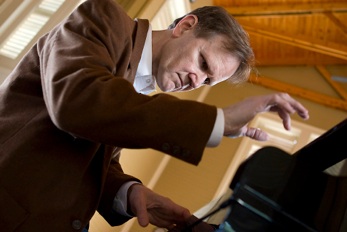
KP: You’re probably the most versatile musician I know. Do you rap, too?
MD: No, I’m afraid not. <laughs>
KP: You go from commercial work to jazz to classical to gospel to your own. How do you switch gears so easily?
MD: I guess it’s all in the ear. I’ve never really had to think about switching gears, so it’s very simple to do. I’m very lucky. There are plenty of classical players who almost can’t hear - all they can do is read. And then there are the people on the other side who can’t read. They’re good musicians, but they’re afraid to learn to read music because they think it will change them somehow.
KP: It’s pretty unusual to find somebody who can do both.
MD: Yes, it is. I’ve had to learn to play by ear and to really listen to what other people are doing. I play with a group of jazz legends several times a year, and one of them is George Doerner, a wonderful trumpet player from Savannah. He’s about 78 years old and playing music is all he has ever done. He has an MBA, but has never needed it. We’ll be onstage with the group, and he’ll look over at me and say, “Bb.” I won’t even know what the song is, and it may be something I’ve never heard before, so I have to really listen. I may miss a chord now and then, but I’ll usually get it because I can hear instinctively where things are going. That’s why we have so many musicians that are a hundred years old - their minds and spirits are engaged in what they are doing.
KP: You call your music “inner music.” What is the difference between “inner music” and “outer music”?
MD: You don’t have to structure the music in any way other than your own feeling about the shape and the emotional content. There is nothing that tells you how long it has to be except your own musical sensibility. With inner music, you start with an idea which has deep, personal meaning, and you allow that idea to blossom where it will. You alone can make the decisions about where to expand it or rein it in, or where you want a contrast. You don’t have any constraints. With inner music, everything is organic. It grows from the unity of an idea. There is nothing pasted onto it, there is nothing done for effect. Several people have said in print that my music is for the heart and the mind. It’s music that’s simple on the surface, but complex underneath. That’s an idea that appeals to me, but it’s not really something that I work for consciously.
KP: Your music is very accessible, but as you get farther into it you discover the layers that are there. A lot of music sounds nice the first time or two, but then it’s kind of tiresome. When somebody really has it, like you do, the music gets deeper the more you listen to it.
MD: It’s nice to have the physical tools to play what I hear and not be the servant of only knowing a few patterns. I hear things in my head. I almost always carry music paper with me. Even when I go walking in the woods, I’ll take a couple of folded up sheets of music paper in my pocket in case I have an idea. Usually, an idea will come with the melody and the accompaniment all at once. It just sort of happens - then I’ll write it out and let it sit. Some pieces come to me all at once, and sometimes they evolve over time. I’m thankful that I can hear something without worrying about whether or not I can play it. That’s another of the many good things that I’ve been exposed to - really good technical teaching. At the same time, I’ve learned a lot from the pop side of things, so there is a marriage of heart and technique. I firmly believe that I bring some of my classical sensibilities to my own playing and composing, and I also have sort of a Motown approach to Beethoven. These things all help to cross-pollinate, and I’m glad for that because I think it enriches everything.
KP: How much concert performing did you do as a classical pianist?
MD: I did a lot of stuff locally, and I did some orchestral dates, but I never really made it into the top echelon. I was in the final twelve at the Carnegie Hall International Competition in 1985. After I played in the semifinals, I went to a very well-known agency in New York, and I talked to one of the two principal guys there. He said “At this level, there is just a hairbreadth difference between whoever wins and whoever finishes in the twelfth spot. The problem is that in the classical market, there is only so much to go around. I can’t sell you unless you win.” Right then, I decided that since I was in demand as a studio player, and I had the ability to make a good living doing studio work, that’s what I was going to do. I didn’t do any more competitions, and devoted myself to working in the studio business. I’ve done a lot of things. I was the musical director for a dinner theater, which gave me great respect for actors. As the director, I was onstage - I had to sing and dance, and I played piano as well as rehearsing all the other people in the group. It terrified me! The thing that scared me more than anything was thinking of getting up there and forgetting my lines. I never worry about that as a player. Playing classical stuff with an orchestra, I’d never worry about forgetting anything, so it was a totally different feeling. I never really felt comfortable doing that. I’ve also done choir directing in church; I’ve taught piano lessons, but I started falling asleep in the lessons.
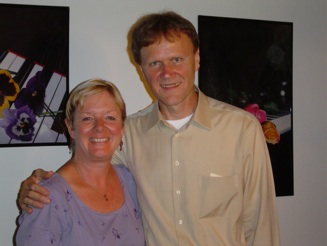
KP: How long did you teach?
MD: I taught as an adjunct faculty member at University of Alabama in Birmingham for four or five years. For fun, I wanted to see if I could get a full-time position. I was one of the top four candidates, but I really wasn’t interested in teaching full-time, so I gave up that idea.
KP: At the university level you just get the serious students, don’t you?
MD: To an extent that’s true, but you really almost have to be an artist-in-residence somewhere to get all of the good students. In my opinion, the whole music system in colleges needs to be revamped - especially in state schools. So many music schools exist, essentially, to have band programs for the football games. In Alabama, we have two big schools, Alabama and Auburn and there are junior colleges everywhere. I think there should be one central college music school. There have to be enough students to justify having the department. If there aren’t a lot of top students, the standards are lowered, bringing in students who really have no business being degree candidates in music - just to justify having a music department. If there is the central music department and music school at the state level, the requirements could be stringent for students who come through. I really think the requirements ought to be just as severe as they are to be a neurosurgeon. There are a lot of people who should be told even before college, “Don’t go into music!” I think it’s great that people enjoy music, and I wish everybody played an instrument, but there’s a difference between being a hobbyist and being a professional. People say music is so subjective, but I really think a professional can tell what’s good in music, art, and drama. To me, there are certain absolutes in art, but we live in a society that doesn’t accept absolutes anymore - everything is relative.
KP: How long did you play keyboards for The Temptations Revue?
MD: Six months. I wish it could have been longer, but I felt like I was leaving too much of a burden on my partner at the studio being gone so much, so I decided I needed to quit. It was great while it lasted, and now I’m a small footnote in Motown history!
KP: Is much of what you do with the jazz legends improvisation?
MD: They let me improvise a lot because I’m good at it. The charts are structured enough so that everybody gets to play, but it’s sort of evolved so that in the middle, we’ll repeat the tune, and then I take a solo. Harmonically, the structure is the same, but I get to do whatever I want over that. George has the greatest Latin charts. I love Latin music, and he’s tried this thing called a montuna. I thought he was talking about the quarterback from San Francisco! A montuna is a breakdown in the middle of a Latin tune that is predominantly piano. I had never heard of it, but I’ve learned how to do it. They made up a plaque for me that says “The World’s Greatest Montunist.” I’ve been fortunate in that I’ve been thrown together with people who could teach me a lot.
KP: You play with such a wide variety of people - country, gospel, you do everything!
MD: We could all do more than we think if only we were exposed and given the opportunity to do it. So many people just follow a single career path. Mine has not been so simple. I’m one of those who has had to do a lot of things because I wanted to stay in music. I have some friends who are now taking an early retirement, but I’m probably going to work until I’m 120! I don’t have any regrets, though. I’m very thankful that I’ve had exposure to so many different kinds of music.
KP: Do you do a lot of music for advertising?
MD: Strangely enough, we have probably done less music in the past couple of years, and more voice overs. It’s just the nature of the business. A lot of the big-budget music things are leaving Birmingham and going to other places because they think they can get better quality somehow in New York or LA. There are a lot of people in the ad business who really can’t tell you which of two tracks is better. It’s like a lot of the record companies.
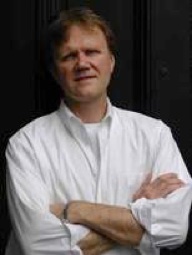
So many of the people who have control of the music now are lawyers or accountants! That’s one reason why the independent artists have come to the fore - they want control over their own music. They don’t want a lawyer telling them what’s good. You can really make more money as an independent now. Record companies want you to have a very large regional following, at least. You have to have your own tours set up, your own mailing list, and they want to see evidence of thousands and thousands of CDs sold before they’ll even look at you. If you can do that, you don’t need a record company! I’m further ahead in sales at this point than I thought I would be. That’s all been through the internet, and it all started with YOU! I really didn’t have any idea of what I was doing when I started. I originally thought I was going to make CDs, put them in the back of my car, and go to little gift shops. I started doing research and saw that I could get onto a sampler here and get some radio play there, and then I started looking around at people who could write reviews. I’d look at one that said, “Kathy Parsons.” Then I’d go look at another one that said, “Kathy Parsons,” and I said, “Who is this Kathy Parsons?” So, I sent you a CD, and you were kind enough to respond. You liked it, and we became good friends, and this has been a great thing! If I have gotten good reviews, it is only because you gave me a good one first. It’s like, “If Kathy likes it, it must be okay.”
KP: I didn’t think that many people read my reviews!
MD: I think our society has reached a point at which, if there is going to be any salvation for classical music, it’s going to have to be in speaking to the person who has not bee trained in it. Classical music has become like Latin - it’s a dead language. I think classical music has to be demystified for the general public, and I think you could provide a valuable service in that regard, Kathy, because you speak as a person who understands music. One doesn’t have to understand classical music or even be able to play it. You just have to know whether you respond to a piece emotionally, whether you like the mood that’s created. Look at what Yo-Yo Ma has done for classical music - and Pavarotti. As far as the public is concerned, these people are more celebrities than classical musicians. They respond to Yo-Yo Ma’s smiling face and the fact that he’s really into what he’s doing. They don’t have to know the Bach Unaccompanied Cello Suites - who cares? It’s all about who the person is behind the music that makes people decide whether they like it.
KP: Do you have CDs in many retail shops?
MD: I have them all over locally, but I was advised to stay out of the big chains. I’ve sold a lot on Amazon as well as my website and CD Baby. The things that have helped the most have been like being on Hearts of Space and David Nevue’s Live365 “Whisperings Solo Piano Radio.” I think you, and other critics who have been kind enough to review my music are read by people who put a lot of stock in what you have to say. Ed Bonk has done a terrific job of promoting my music on the radio, and my CDs are playing on over 200 stations worldwide. Both of my CDs were #1 on New Age Reporter, and both were in the Top 10 for the year 2003. I recently sent some materials to a distributor in Korea. I don’t know how my music got to Korea, but this person wants to distribute my music in Korea and act as my agent for licensing to the Korean film and television industry.
KP: That seems to be the fastest-growing market for this kind of music
MD: I think it is. The most wonderful thing about this kind of music is that it appeals to people who are intelligent, who know how to make up their own minds, and who are willing to try new things. I think the more independent you are, the less you need somebody to put labels on things. There is so much variety in music. That’s why I think that my next CD, “Timeless,” which is a classical album due for July release, is really no different. It still creates a mood, it still is directed at the heart. People have been taught to fear classical music by people who are using it almost like a weapon. They’re using classical music to make themselves seem more intelligent. Like a country club might exclude certain people, it’s the same thing with some classical music people. You don’t have to be sophisticated - all you have to do is have two ears and a heart. This next CD happened as an outgrowth of a licensing thing where they wanted me to do a 60-minute classical CD for spas. I’m still going to license it, but not exclusively. I’m not doing all of the music literally. I’m adding pads, reinforcing the bass here and there, and I added some small string parts to a Chopin Nocturne. I don’t think there’s a thing wrong with that, because you continually reinterpret things.
There are a lot of trends in classical music that I don’t agree with. I don’t think it’s necessary to use period instruments or to try to guess what people were doing back then. The accounts of Beethoven playing his own music show a performer who would probably be laughed out of the concert hall now because it is thought to be unprofessional to be free and play the same great music in different ways from day to day. You’re supposed to arrive at this holy interpretation, and always play it the same way. Czerny heard Beethoven and said he played the same piece in a totally different way, depending on how he felt. Today, that would be thought of as being amateurish. Beethoven would look at how most pianists play his music today as being dry as dust. I say, do what you think, what you feel.
KP: Are you going to do a series of classical albums?
MD: I think so. I have to find some more classical lullabies, though, because it’s my thing now - I put a lullaby on every CD! The next one has the Chopin Berceuse, but I have to find some others.
KP: Are you doing much composing of new full-length pieces right now?
MD: I’m putting down themes. I want to do sort of a smooth jazz CD, and I’ve got a bunch of smooth jazz ideas. At some point, I want to do a standards CD. There are pieces that I learned to play with George - old standards from the 40’s that are so beautiful! They may have been big hits, but it was before I was born, and I had never heard them. I think that within the new age genre, there is room to do a lot of different styles, and I think that these different styles would appeal to the same kind of people.
KP: Do you have any hobbies?
MD: I love to read, and if possible, I would like to have some land where I can have horses. I love animals. Except cats. I hate cats. Sorry… I also like hiking in the woods, going to museums, and studying German.
KP: If you could have any three wishes, what would they be?
MD: 1. More silence in the world. Music can’t be truly appreciated unless it emerges from silence. Silence is to music what a frame is to a picture.
2. More listening – to what people are really saying.
3. More honesty and sincerity, starting with me and spreading outward to consume the world.
KP: Do you have any words of advice for young people who are studying music now?
MD: Work HARD, commit yourself to every note you play. Listen to your teachers, but don’t be afraid to question. Music is all about expressing what is unique and special about YOU – that special something that exists only in you, and nowhere else in the universe. Music is the language that can best express that uniqueness. Don’t be afraid to be different. All the great people who ever accomplished anything significant in this world, dared to be different. Be who you are, and that will be enough.
Many thanks to Michael Dulin for sharing his life story (so far!) with us. For more information about Mike and Equity Digital, visit
his website and his
Artist Page on MainlyPiano.com. We’ll look forward to meeting you in July, Mike!
Kathy Parsons
April 2004

